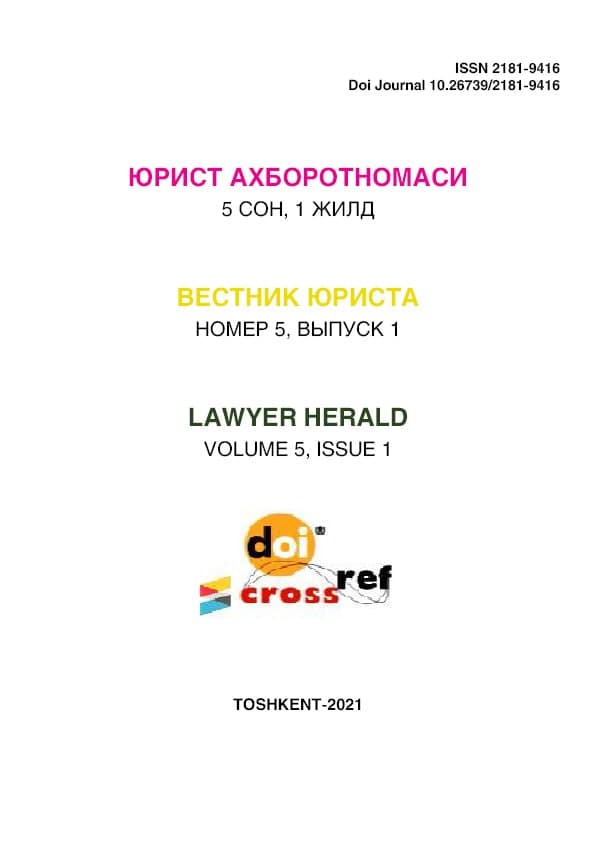Abstract
This article reviews the progress that has been made in Uzbekistan with regards to educating and training different layers of population in the field of human rights. Special attention is paid to the changes in the lives of vulnerable groups stemming from the application of modes and modalities of UN Declaration of Human Rights Education and Training in life. The work is presented as overview of headway made in human rights education throughout the first ten years of adopting the Declaration by Uzbekistan. Role of human rights education in the lives of young people and women is discussed in detail before highlighting the challenges created in the field with the spread of global pandemic. Finally, recommendations to move forward in the field are provided as the unique outcome of the work.
References
1. Office of the High Commissioner for Human Rights, ‘United Nations Human Rights Appeal 2021’ // URL: https://www.ohchr.org/Documents/Publications/AnnualAppeal2021.pdf.
1. United Nations Declaration on Human Rights Education and Training (2011). Article 1, paragraph 2.
3. Office of the High Commissioner for Human Rights, ‘About the right to education and human rights’. // URL: https://www.ohchr.org/EN/Issues/Education/SREducation/Pages/EducationAndHR.aspx.
4. Institute for Research of Youth Problems and Training Prospective Personnel at the Academy of Public Administration under the President of the Republic of Uzbekistan, ‘The Law of the Republic of Uzbekistan “On State Youth Policy”. // URL: https://yomi.uz/en/the-law-of-the-republic-of-uzbekistan-on-state-youth-policy/.
5. The Central Election Commission of the Republic of Uzbekistan ‘Parliamentary Elections on December 22, 2019’. // URL: https://elections.uz/en/lists/view/2246.
6. Approved by the Joint Resolution of the Council of the Legislative Chamber of the Oliy Majlis of the Republic of Uzbekistan and the Council of the Senate of the Oliy Majlis of the Republic of Uzbekistan dated July 15, 2019 No.2600-III/PK-563-III.
7. Th e official website of the National Centre for Human Rights. ‘Инсон ҳуқуқлари соҳасидаги Жаҳон таълим дастурини амалга ошириш бўйича Миллий комиссия тузилди’. // URL: http://insonhuquqlari.uz/uz/news/national-commission-for-the-implementation-of-the-world-program-for-human-rights-education-established.
8. Udz.uz ‘Международная конференция на актуальную тему’ // URL:https://udz.uz/rus/news/mejdunarodnaya_konfereniya_na_aktualnuyu_temu.html; https://www.s-cica.org/news_detail/?newsid=262.
9. Uzdaily, ‘The importance of promoting and protecting youth rights in building peaceful, democratic societies and sustainable development’. // URL: http://www.uzdaily.com/en/post/52291.
10. AsianForum, ‘Tashkent Declaration’. // URL: https://www.asianforum.uz/en/menu/tashkent-declaration.
11. OSCE, ‘The rights of young people focus of the Samarkand Human Rights Forum’. // URL: https://www.osce.org/secretariat/459994.
12. Official web-site of the President of Uzbekistan, ‘Speech by the President of the Republic of Uzbekistan Shavkat Mirziyoyev at the 46th Session of the United Nations Human Rights Council’ // URL: https://president.uz/en/lists/view/4179.
13. UNDP in Uzbekistan, ‘Women’s rights in a changing society’ // URL: https://www.uz.undp.org/content/uzbekistan/en/home/blog/2020/how-uzbekistan-is-changing-its-attitudes-towards-womens-rights.html.
14. Interkomitet, ‘Academician Akmal Saidov on the gender policy of the new Uzbekistan in the context of international trends in parliamentarism’ // URL: https://interkomitet.uz/main/academician-akmal-saidov-on-the-gender-policy-of-the-new-uzbekistan-in-the-context-of-international-trends-in-parliamentarism/?lang=en.
15. Society.at, Akmal Saidov. ‘Policies for gender equality in modern Uzbekistan Part I’ // URL: https://www.society.at/policies-for-gender-equality-in-modern-uzbekistan-part-i/.
16. Suyunova Kumush Akhatovna, Dimensions of human rights and derogation clauses during COVID-19 pandemic under article 15 of the European convention on human rights (ECHR) // URL: https://yuristjournal.uz/index.php/lawyer-herald/article/view/156.
17. William A. Schabas, The European Convention on Human Rights: A Commentary (OUP 2015).
18. Greene, A. (2020). Emergency Powers in a Time of Pandemic (1st ed.). Bristol University Press. https://doi.org/10.2307/j.ctv1850gbm.
19. Official website of NCHR, ‘Special Training Module on Human Rights’ // URL: http://insonhuquqlari.uz/en/news/special-training-module-on-human-rights.
20. Khandagale, Vidyanand. (2016). ‘Information Communication Technologies and Human Rights in 21st Century’ // URL: https://www.researchgate.net/publication/303895075_Information_Communication_Technologies_and_Human_Rights_in_21st_Century.
21. Adopted by the General Assembly, Resolution 66/137, A/RES/66/137, 19 December 2011.
22. United Nations Declaration on Human Rights Education and Training (2011) // URL: https://www.ohchr.org/EN/Issues/Education/Training/Compilation/Pages/UnitedNationsDeclarationonHumanRightsEducationandTraining(2011).aspx.
